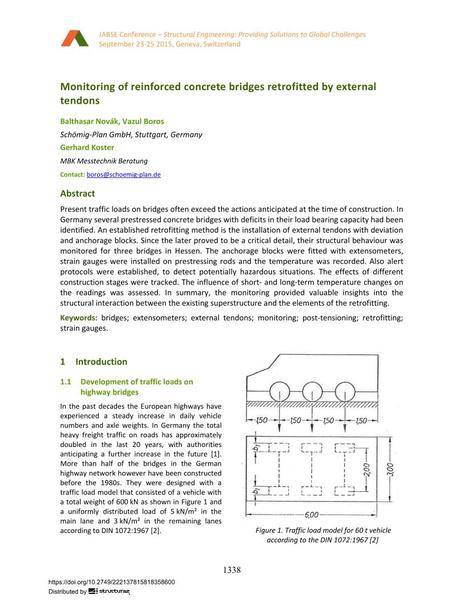Monitoring of reinforced concrete bridges retrofitted by external tendons

|
|
|||||||||||
Bibliographic Details
| Author(s): |
Balthasar Novák
(Schömig-Plan GmbH, Stuttgart, Germany)
Vazul Boros (Schömig-Plan GmbH, Stuttgart, Germany) Gerhard Koster (MBK Messtechnik Beratung) |
||||
|---|---|---|---|---|---|
| Medium: | conference paper | ||||
| Language(s): | English | ||||
| Conference: | IABSE Conference: Structural Engineering: Providing Solutions to Global Challenges, Geneva, Switzerland, September 2015 | ||||
| Published in: | IABSE Conference Geneva 2015 | ||||
|
|||||
| Page(s): | 1338-1345 | ||||
| Total no. of pages: | 8 | ||||
| Year: | 2015 | ||||
| DOI: | 10.2749/222137815818358600 | ||||
| Abstract: |
Present traffic loads on bridges often exceed the actions anticipated at the time of construction. In Germany several prestressed concrete bridges with deficits in their load bearing capacity had been identified. An established retrofitting method is the installation of external tendons with deviation and anchorage blocks. Since the later proved to be a critical detail, their structural behaviour was monitored for three bridges in Hessen. The anchorage blocks were fitted with extensometers, strain gauges were installed on prestressing rods and the temperature was recorded. Also alert protocols were established, to detect potentially hazardous situations. The effects of different construction stages were tracked. The influence of short- and long-term temperature changes on the readings was assessed. In summary, the monitoring provided valuable insights into the structural interaction between the existing superstructure and the elements of the retrofitting. |
||||
| Keywords: |
bridges strain gauges post-tensioning retrofitting extensometers monitoring external tendons
|
||||

